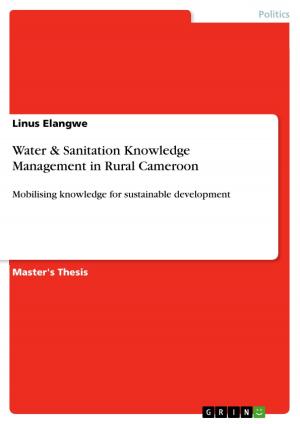The Implications of the rising demand for biofuels on developing/emerging economies
Any lessons from petroleum trade
Business & Finance| Author: | Derrick Tawah Ngwa | ISBN: | 9783640175338 |
| Publisher: | GRIN Publishing | Publication: | September 24, 2008 |
| Imprint: | GRIN Publishing | Language: | English |
| Author: | Derrick Tawah Ngwa |
| ISBN: | 9783640175338 |
| Publisher: | GRIN Publishing |
| Publication: | September 24, 2008 |
| Imprint: | GRIN Publishing |
| Language: | English |
Master's Thesis from the year 2007 in the subject Business economics - Miscellaneous, grade: 1.3, Berlin School of Economics, 120 entries in the bibliography, language: English, abstract: The rapid process of economic growth and of industrialisation especially in the South has had major impacts and implications on the rest of the world. Energy is one area which has been greatly affected by the rapid growth of most of the economies of the southern hemisphere. The oil boom that has been going on since the end of the 1990's is a direct response to the events in the South and has increased the hopes of further economic growth for oil-producing countries; though complicating the chances of economic growth for oil-importing countries. The rising oil price which stood at $70, 85 a barrel in 2005, rising from $40, 00 a barrel in 2004 is the highest price of oil ever. The high oil price implies mounting oil bills of many countries, a worse case scenario for developing and emerging economies. Many of these countries especially in East Africa are experiencing energy problems after droughts have reduced hydroelectricity generation. According to the AFDB (2006), first round effects of the high oil price will be an average inflation that will also hinder growth. Global warming, the effect of climate change which is believed to result from GHG emissions primarily originating from the burning of fossil fuels further complicates the energy dilemma. There must be according to the UNFCCC Kyoto protocol, a reduction in the growth of these gases. Therefore high oil price and Global warming have become first movers in driving the race to alternative energy, of which Biofuels form an integral part. Many developing and emerging countries including, 'Angola, Mozambique, and South Africa is proving fertile ground for those seeking an alternative to fossil fuel'. Africa as well as South East Asia is not escaping the notice of Europe as well as other countries with major Biofuels energy targets. In the EU 'Green paper'; the EU affirms that the EU-Africa strategy has to include energy so as to diversify energy resources away from oil and gas. Africa has embraced this development also as it eyes the potential market in Europe. The question that arises is: Would Biofuels act as an engine of growth? Would the experiences be different from those in oil-producing countries who have been caught up in the 'resource curse phenomena?
Master's Thesis from the year 2007 in the subject Business economics - Miscellaneous, grade: 1.3, Berlin School of Economics, 120 entries in the bibliography, language: English, abstract: The rapid process of economic growth and of industrialisation especially in the South has had major impacts and implications on the rest of the world. Energy is one area which has been greatly affected by the rapid growth of most of the economies of the southern hemisphere. The oil boom that has been going on since the end of the 1990's is a direct response to the events in the South and has increased the hopes of further economic growth for oil-producing countries; though complicating the chances of economic growth for oil-importing countries. The rising oil price which stood at $70, 85 a barrel in 2005, rising from $40, 00 a barrel in 2004 is the highest price of oil ever. The high oil price implies mounting oil bills of many countries, a worse case scenario for developing and emerging economies. Many of these countries especially in East Africa are experiencing energy problems after droughts have reduced hydroelectricity generation. According to the AFDB (2006), first round effects of the high oil price will be an average inflation that will also hinder growth. Global warming, the effect of climate change which is believed to result from GHG emissions primarily originating from the burning of fossil fuels further complicates the energy dilemma. There must be according to the UNFCCC Kyoto protocol, a reduction in the growth of these gases. Therefore high oil price and Global warming have become first movers in driving the race to alternative energy, of which Biofuels form an integral part. Many developing and emerging countries including, 'Angola, Mozambique, and South Africa is proving fertile ground for those seeking an alternative to fossil fuel'. Africa as well as South East Asia is not escaping the notice of Europe as well as other countries with major Biofuels energy targets. In the EU 'Green paper'; the EU affirms that the EU-Africa strategy has to include energy so as to diversify energy resources away from oil and gas. Africa has embraced this development also as it eyes the potential market in Europe. The question that arises is: Would Biofuels act as an engine of growth? Would the experiences be different from those in oil-producing countries who have been caught up in the 'resource curse phenomena?















